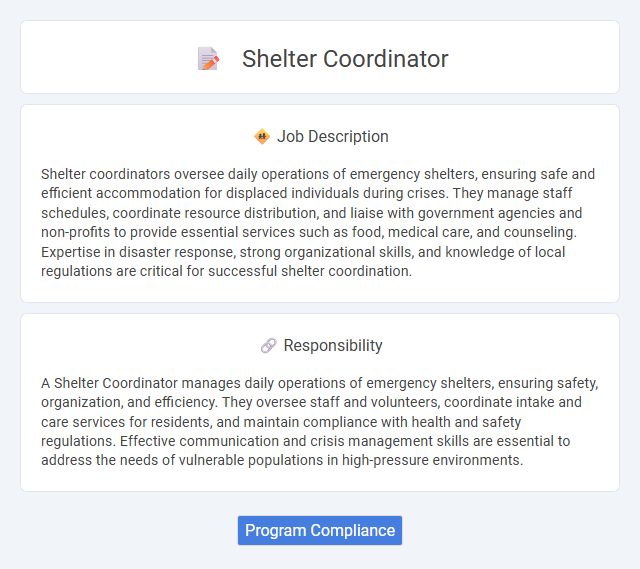
Shelter coordinators oversee daily operations of emergency shelters, ensuring safe and efficient accommodation for displaced individuals during crises. They manage staff schedules, coordinate resource distribution, and liaise with government agencies and non-profits to provide essential services such as food, medical care, and counseling. Expertise in disaster response, strong organizational skills, and knowledge of local regulations are critical for successful shelter coordination.
Individuals with strong organizational skills and emotional resilience are likely suitable for a Shelter Coordinator role, as the job involves managing shelter operations and supporting people in crisis. Those who can handle high-pressure situations calmly and communicate effectively with diverse populations may find success in this position. People struggling with stress management or lacking empathy might face challenges in meeting the demands of this role.
Qualification
A Shelter Coordinator typically requires strong organizational skills, experience in emergency management, and proficiency in coordinating shelter operations during crises. Key qualifications include a background in social services, public administration, or emergency response, along with certifications such as FEMA's ICS-100 and Shelter Management courses. Effective communication, leadership abilities, and knowledge of local resources are essential to ensure the safety and well-being of shelter residents.
Responsibility
A Shelter Coordinator manages daily operations of emergency shelters, ensuring safety, organization, and efficiency. They oversee staff and volunteers, coordinate intake and care services for residents, and maintain compliance with health and safety regulations. Effective communication and crisis management skills are essential to address the needs of vulnerable populations in high-pressure environments.
Benefit
Shelter Coordinator roles likely provide significant benefits such as comprehensive health insurance, paid time off, and retirement plan options that enhance job satisfaction and financial security. Employees may also experience a supportive work environment fostering professional growth through training and development opportunities. Access to community resources and a sense of meaningful impact could contribute to overall well-being and job fulfillment in this position.
Challenge
The Shelter Coordinator role likely involves managing limited resources and responding to unpredictable emergency situations, presenting significant challenges in ensuring smooth operations. Coordinating staff and volunteers under pressure may require quick decision-making and strong organizational skills. Navigating emotional stress from clients and maintaining facility safety could also contribute to the complexity of the position.
Career Advancement
The Shelter Coordinator role offers significant career advancement opportunities by developing strong leadership, crisis management, and organizational skills essential for higher positions within nonprofit and emergency management sectors. Experienced Shelter Coordinators often transition to roles such as Disaster Response Manager, Program Director, or Community Outreach Manager, leveraging their hands-on experience coordinating large-scale shelter operations. Mastery of resource allocation, staff training, and stakeholder communication directly correlates with increased responsibilities and professional growth in humanitarian and social services careers.
Key Terms
Program Compliance
A Shelter Coordinator ensures strict adherence to program compliance by implementing shelter policies, safety regulations, and funding guidelines effectively. They monitor documentation accuracy and conduct regular audits to guarantee alignment with federal, state, and local standards. Maintaining clear communication with regulatory bodies and internal teams supports continuous improvement and accountability in shelter operations.
 kuljobs.com
kuljobs.com